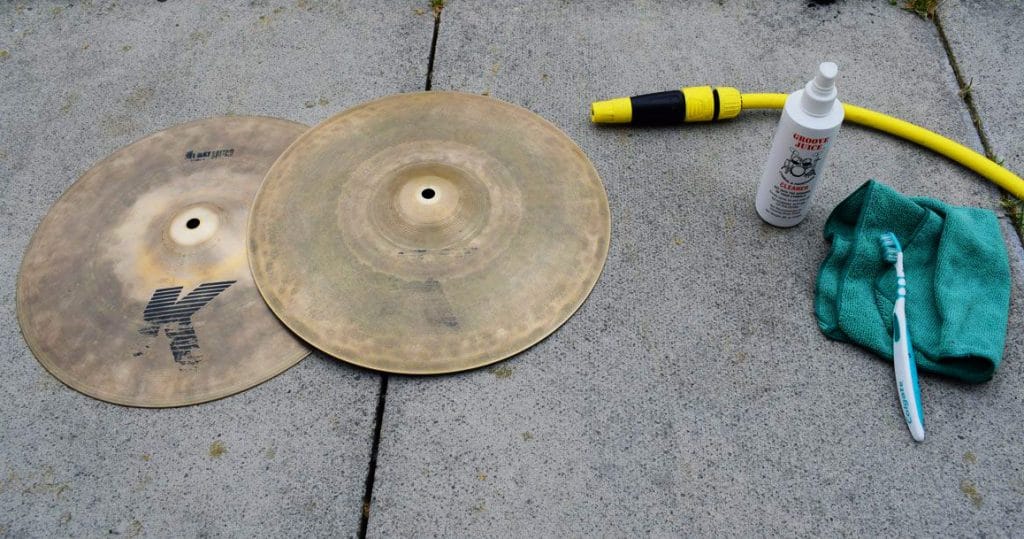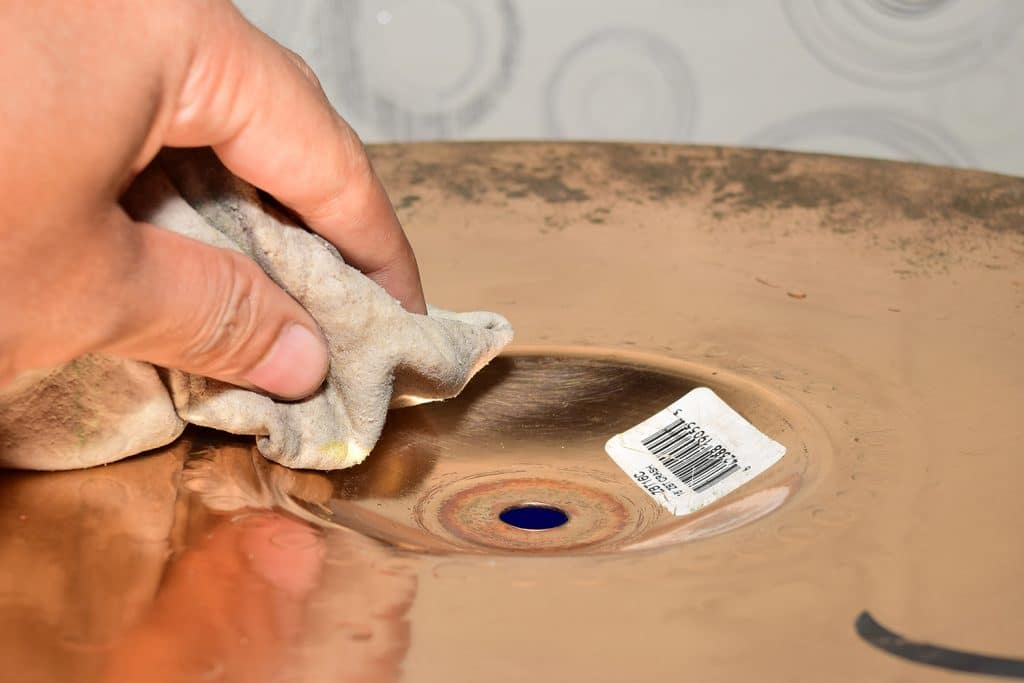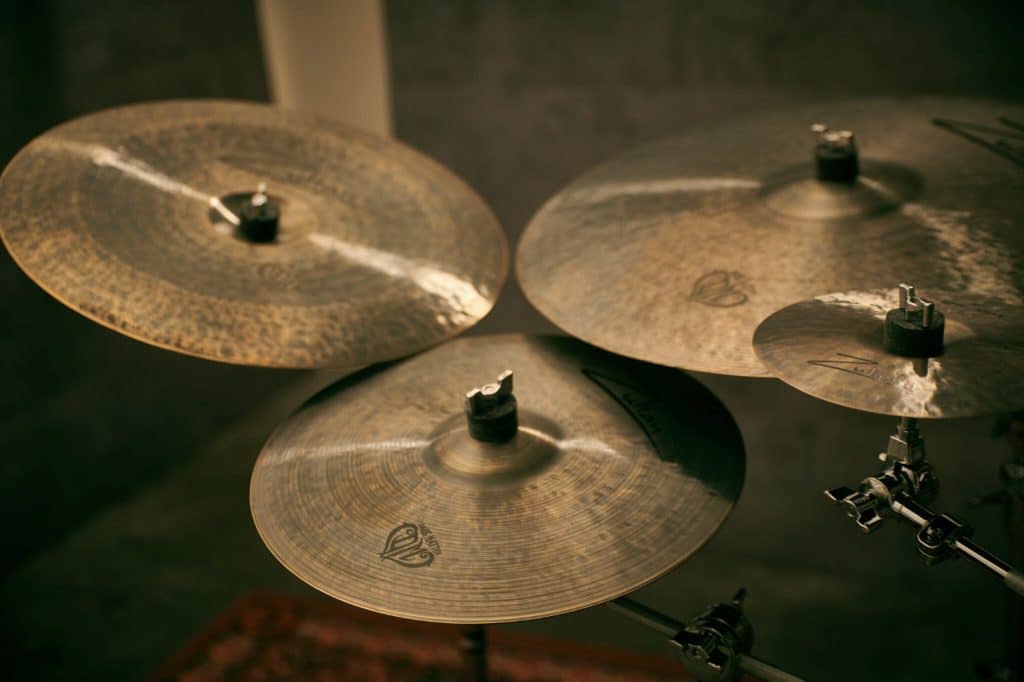Any percussionist will care deeply about the sound of the drum kit, and the cymbals are a large part of that. Over time their sound can become duller and not quite as crisp as it used to be. Maintenance is key to them sounding great year after year.
While some like the warm sound that an old uncleaned cymbal will bring, most others will want it as bright as possible. Not only do clean cymbals produce a clearer sound, but they also look a lot better.
Thankfully, there are plenty of ways to keep your cymbals clean and looking like new. Here, we give you the ultimate guide on how to clean cymbals.

The best way to clean your cymbals is with a brand-specific cymbal cleaner. If the manufacturer of your cymbals doesn’t offer a cleaner or it’s too expensive, then there are other cheaper cymbal cleaners out there, which can do the job. If you’re wondering how to clean cymbals with Brasso, then it’s going to be the same process.
All you need to do is spray the solution evenly across the whole cymbal, making sure all the area is covered. Straight away, you’ll see some of that shine come back to the cymbal. This is great if you’re looking for how to clean traditional finish cymbals as you need to give them the greatest care.
Next, you need to scrub the cymbal, but this should only be done with a soft brush, such as a toothbrush. Scratching the surface will expose the metal to oxygen and quickly lead to corrosion.
If the cymbal cleaner is not at hand, you could just use washing detergent. This needs to be a mild detergent, and not a lot of it is required.
It’s best to fill a bowl with warm water and detergent so that your cymbal can soak. You then wash this with a soft cloth to remove the grime. Again, if you need to get rid of stubborn dirt, then do this with a soft brush.
Once you’re finished, rinse the cymbals with clean water. In terms of how to clean cymbals with household items, there are also other options.
If you’re wondering how to clean cymbals with lemon juice or vinegar, it can be done. Once rubbed onto the surface, these will remove the dirt and grime and help to bring some of that shine back to the cymbal. The vinegar has been proven to be an effective cleaner in a wide variety of situations.
Once this has been scrubbed into the cymbal, then it can simply be washed away.
Did you know that you can use ketchup to clean your cymbals in the same way? It’s important to note that vinegar, ketchup, and lemon are all acidic, and, therefore, it shouldn’t be left on there for too long.

While cymbals may feel like they are exposed metal, they usually have a very thin layer of lacquer on their surface. This helps to keep the shine on the cymbal and to prevent it from oxidizing where a patina can develop over time.
If you try and clean a cymbal with a wire brush, for example, then it will scrape off this lacquer and leave the exposed brass underneath. In terms of how to clean tarnished cymbals, this will be less of an issue, but you still don’t want to scratch the surface.
Scratching the surface, even if it doesn’t have a lacquer finish, can affect the sound quality of the cymbal. There are many soft brushes that you can buy, but you can also use an old toothbrush, which is great for gently getting into those crevices.
Once you’ve cleaned and rinsed your cymbals, then you want to dry them as soon as possible. This is because you don’t want them to have long-term exposure to water. The best way to do this is by placing them on a soft towel and then using a soft, clean, and dry cloth in order to soak up any moisture.
The cleaning of the cymbal would have most likely brightened them up, but if you want them to look like new, then a little bit of polish is going to be needed. It’s best to use cymbal polish for the brand you have, but if that’s not available, then get a polish, which matches the metal used on your cymbal.
It’s best to work in small sections with a small amount of polish then use a soft cloth in order to push it around in a clockwise direction. Make sure that you’ve wiped up all of the polish and don’t leave any residue sitting on the cymbal.

While cleaning your cymbals is fairly easy, you don’t want to have to do it all the time. If you take care of your cymbals, then they will be able to last for a lot longer, and there are a few things you can do.
Drum cover – Having a sheet over all of your drum kit pieces when it’s not in use will keep it in great condition. If you don’t want to cover your whole kit, then make sure the cymbals are covered.
Use a case – A case is essential if you’re traveling in order to keep your cymbals in a dry and clean environment. It’s much better to get a hard case as this will protect the drums from any impacts, which could distort them and affect the sound.
Proper handling – Hands have moisture and oils, which are bad for cymbals. When carrying them, it’s a good idea to do so with the edges pressed into your palms rather than gripping them. You can also carry a dry cloth with you to wipe them down.
You have these pieces of metal that you’re constantly hitting with a stick, it almost doesn’t make sense that they need to be cared for. The truth is that they were made to be hit but not to have a buildup of grime and moisture.
If you follow these steps, then you’ll have cymbals that look great, sound bright and brilliant, and also last for a lot longer. It’s a great idea to invest in some cymbal cleaner and polish in order to keep them looking at their best for as long as possible.